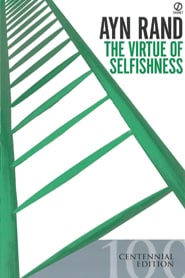

Selfishness — a virtue? Ayn Rand chose this book’s provocative title because she was on a mission to overcome centuries of demonization. “In popular usage,” Rand writes, “the word ‘selfishness’ is a synonym of evil; the image it conjures is of a murderous brute who tramples over piles of corpses to achieve his own ends . . . and pursues nothing but the gratification of the mindless whims of any immediate moment.
“Yet the exact meaning and dictionary definition of the word ‘selfishness’ is: concern with one’s own interests.
“This concept does not include a moral evaluation; it does not tell us whether concern with one’s own interests is good or evil; nor does it tell us what constitutes man’s actual interests. It is the task of ethics to answer such questions.”
In this collection of articles, Rand offers a “new concept of egoism” based on reason as man’s means of survival and opposed to all forms of sacrifice.
— Ayn Rand, “The Objectivist Ethics,” The Virtue of Selfishness
Most ethical discussions take for granted the supreme moral value of selfless service. Debate then centers on details: Should we serve an alleged God or substitute “society” for God? How much sacrifice is required? Who’s entitled to benefit from others’ sacrifices?
In this volume’s lead essay, “The Objectivist Ethics,” Ayn Rand challenges that basic assumption by reconsidering ethics from the ground up. Why, she asks, does man need morality in the first place? Her answer to that question culminates in the definition of a new code of morality, based in rational self-interest, aimed at each individual’s life and happiness, and rejecting sacrifice as immoral.
In additional articles, Rand expands her theory and discusses practical questions such as: Do people face intractable conflicts of interest? Isn’t everyone selfish? Doesn’t life require compromise? How do I live in an irrational society? What about the needs of others? What are political rights? What’s the rational function of government? Her fresh, provocative answers cast new light on what it means to be genuinely selfish.
“Observe the indecency of what passes for moral judgments today. An industrialist who produces a fortune, and a gangster who robs a bank are regarded as equally immoral, since they both sought wealth for their own ‘selfish’ benefit. A young man who gives up his career in order to support his parents and never rises beyond the rank of grocery clerk is regarded as morally superior to the young man who endures an excruciating struggle and achieves his personal ambition. . . .
“Yet . . . there is a fundamental moral difference between a man who sees his self-interest in production and a man who sees it in robbery. The evil of a robber does not lie in the fact that he pursues his own interests, but in what he regards as to his own interest; not in the fact that he pursues his values, but in what he chose to value; not in the fact that he wants to live, but in the fact that he wants to live on a subhuman level . . . .”
— Ayn Rand, “Introduction,” The Virtue of Selfishness
It is commonly believed that morality demands we choose between sacrificing other people to ourselves (which is deemed “selfish” and therefore immoral) and sacrificing our own values to satisfy others’ needs (which is deemed unselfish and therefore moral). In this book, Rand rejects both options as forms of selflessness, and offers a new concept of egoism — an ethics of rational selfishness that rejects sacrifice in all its forms.
Selfishness, however, does not mean “doing whatever you please.” Moral principles are not a matter of personal opinion — they are based in the facts of reality, in man’s nature as a rational being, who must think and act successfully in order to live and be happy. Morality’s task is to identify the kinds of action that in fact benefit oneself. These virtues (productivity, independence, integrity, honesty, justice, pride) are all applications of the basic virtue, rationality. Rand’s moral ideal is a life of reason, purpose and self-esteem.
Most people take for granted that actions intended to benefit others are good and that actions intended to benefit oneself are bad. One of the book’s themes is that this “beneficiary-criterion of morality” makes it impossible to even conceive of self-interest as moral.
In order to make room for her “new concept of egoism,” Rand identifies the opposite of selfishness as altruism (literally, “otherism”) and argues that making service to others the hallmark of moral action obscures the real issues in ethics: What are values? Why do we need them? How do we decide who should be the beneficiary of our actions?
Only when one answers these questions, Rand argues, is one in a position to evaluate egoism and altruism as good or evil.
One theme of this book is that morality is a matter of principle, not divine revelation or subjective desire. A properly defined principle — one that identifies an actual truth about human action — should be acted upon consistently, never compromised.
“There can be no compromise on basic principles or on fundamental issues,” Rand writes. “What would you regard as a ‘compromise’ between life and death? Or between truth and falsehood?” Moral principles are indispensable guides to action in real-life situations, if one’s goal is to attain individual happiness.
Unfortunately, principles have gotten a bad name because conventional ideals like self-sacrifice cannot be consistently practiced without inviting disaster. As a result, compromise becomes essential to survival, consistency seems dangerous, and philosophers like Rand are marginalized as dangerous fanatics.
In such articles as “Doesn’t Life Require Compromise?,” “The Cult of Moral Grayness” and “The Argument from Intimidation,” Rand discusses these issues in detail.
Egoists are generally assumed to prey on others. In Rand’s view, however, individuals derive indispensable benefit from exchanging values with other people. “A trader,” she writes, “is a man who earns what he gets and does not give or take the undeserved. He does not treat men as masters or slaves, but as independent equals. He deals with men by means of a free, voluntary, unforced, uncoerced exchange — an exchange which benefits both parties by their own independent judgment.”
In this broad sense, Rand’s “trader principle” encompasses not only economic transactions but all voluntary human relationships. In such articles as “The Ethics of Emergencies,” “Collectivized Ethics” and “The ‘Conflicts’ of Men’s Interests,” Rand argues that we need to reconceive the place of the welfare of others and of the individual in ethics, and to question the idea that the interests of rational men conflict.
Although the egoistic individual is perfectly at home in society, he recognizes that other people hold the power to destroy the value of social life by initiating physical force against him — in the form of criminal acts or, more dangerously, improper government coercion.
One of this book’s themes is that morality must identify principles to identify and guard against this threat. In her essay “Man’s Rights,” Rand presents her case for individual rights — moral principles that spell out one’s proper sphere of freedom — and grounds the rights to life, liberty, property and the pursuit of happiness that were America’s founding principles. Far from being self-evident, these principles need a new moral defense. In “The Nature of Government,” Rand argues that a constitutional republic on the American model (with certain crucial flaws corrected) is necessary to protect individual rights, and that this is the only valid purpose of government.